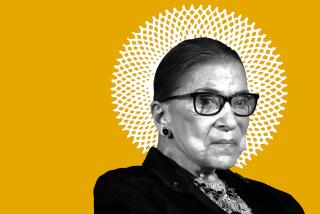REINHOLD NIEBUHR: A BIOGRAPHY by Richard Fox (Pantheon: $19.95; 279 pp., illustrated) : THE ESSENTIAL REINHOLD NIEBUHR: SELECTED ESSAYS AND ADDRESSES, edited and introduced by Robert McAfee Brown (Yale: $19.95; 257 pp.)
- Share via
“He appeared among us like a sublime figure out of the Hebrew Bible.” Such was the assessment of Reinhold Niebuhr offered by Rabbi Heschel at his funeral. Two new books--one a biography of Niebuhr and one a set of selections from his work--are continuing echoes of that earlier judgment. Fifteen years after the death of this preacher, political organizer, religious thinker, social critic and famed teacher, interest in his life and work continues to build.
Richard Fox, a historian at Reed College, has given a definitive, critical (in the sense of impartial) biography of Niebuhr. In it, Fox’s “quest for the historical Reinhold” comes close to fulfillment. A good deal of the attraction of his quest is his full portrayal of Niebuhr, warts and all. Yet the “sublime figure” shines through.
What is revealed biographically in Fox’s book is manifested directly in Robert McAfee Brown’s judicious selection of Niebuhr’s essays, addresses, sermons and prayers. Brown, professor emeritus of theology and ethics at the Pacific School of Religion and a student and friend of Niebuhr, introduces the selection with an interpretive essay of his own.
This increasing interest in Niebuhr can be attributed to several factors. He was a fascinating person whose life and work are interesting in their own right. His career illuminates and is illuminated by the American religious, political and cultural currents in which it was played out. Each book contributes importantly to those historical interests.
However, there is a more direct and contemporary reason for enhanced attention to Niebuhr. That has to do with the great debate over the role of American religion in the public order, particularly politics. Niebuhr’s “Christian realism,” which is amply exhibited and analyzed in both books, provides an important model of how religion should relate to politics. It first demonstrates that religion is relevant, in opposition to various brands to secularism that wish to shut it out completely. But it also contrasts with the current rigid interventions of the religious right and left, both of which claim altogether too much divine sanction for their partisan agendas. Niebuhr’s approach emphasizes ambiguity and partialness of all political efforts before the transcendent will of God. It dialectically pronounces a “yes” and “no” to those efforts without relaxing the demand to make them. Its inner biblical core remains constant; policy applications are open to revision.
Niebuhr was a living embodiment of the conviction that religion matters in public life. Fox shows how he demonstrated that conviction in a life-long interaction--intellectual and organizational--with the political and cultural elite of the day. Adlai Stevenson, Hubert Humphrey, John F. Kennedy, Arthur Schlesinger Jr., George Kennan, Chester Bowles, Hans Morgenthau, W.H. Auden, Arnold Toynbee, Karl Barth and Jacques Maritain are only a few of the luminaries he engaged directly. It wasn’t that Niebuhr was always right on public issues--he thought the Arab anger over the creation of Israel would quickly subside, for instance. His main gift was his ability to articulate in a publicly intelligible way the classic insights of biblical faith into public affairs. As Fox puts it: “His prime intellectual contribution was to weld together the tragic sense of life and the quest for justice.” Put another way, Niebuhr was able dynamically to relate his inherited Christian orthodoxy--with its insistence on the seriousness of human sin and the reality of divine judgment and mercy--to the restless American search for a better world. His Christian apologetics led McGeorge Bundy to describe Niebuhr as “probably the most influential single mind in the development of American attitudes which combine moral purpose with a sense of political reality.”
If Fox traces the practical way that Niebuhr engaged the public world with that biblical vision, Brown’s selection of his work illustrates the remarkable dialectical way in which he approached every topic, including nonpolitical ones such as humor. He was able to see the paradoxes of life without being paralyzed by them.
These books, like the man, are not perfect. Fox fails to account for the sources of Niebuhr’s early political radicalism. He mistakenly suggests that the early Niebuhr saw only “functional truth” in Christian belief. His text sometimes reads like an encyclopedia. Brown should have included an essay directly dealing with the individual and collective sin. Further, he spends too much space in the introduction chastising those whose appropriation of Niebuhr leads to political options different than his, without admitting that Niebuhr’s approach would raise questions about his own opinions.
Nevertheless, Niebuhr is presented accurately and powerfully. In the portrait of that wildly energetic ethnic American who was as paradoxical as America itself, some serious faults appear. He was often unfair to opponents, only fleetingly present in many important personal relationships. But he had the virtue of directing the unrelenting beam of God’s judgment on himself. He exemplified his own dictum that “the righteous know they are not righteous.” These two books indicate that Niebuhr’s Christian realist view of life is still, as Fox has it, “a compelling model of the moral vocation.”
More to Read
Sign up for our Book Club newsletter
Get the latest news, events and more from the Los Angeles Times Book Club, and help us get L.A. reading and talking.
You may occasionally receive promotional content from the Los Angeles Times.










